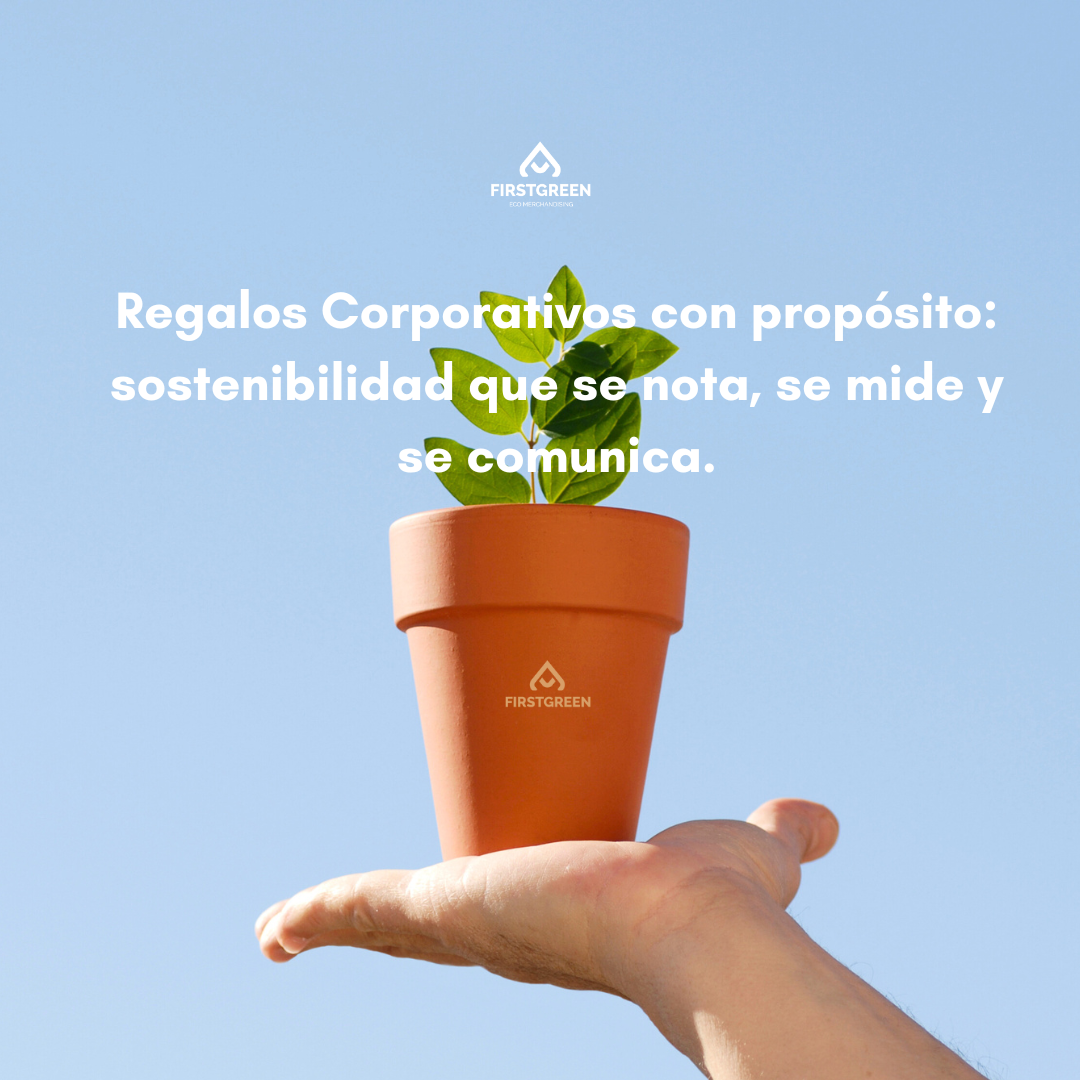More and more companies understand that sustainability is no longer an option, but an expectation. What was once an added value is now a fundamental criterion for employees, customers, and investors. In this context, sustainable promotional products—well-selected, measurable, and aligned with brand values—are a strategic communication tool.
At FirstGreen We work with an approach based on traceability and real impact. We don't just talk about "being eco-friendly," but about building a coherent and credible narrative, supported by data, certified materials, and responsible design.
Why choose sustainable merchandising?
Promotional gifts are an extension of the corporate message. Every time a company gives away a product with its logo, it also communicates its values. If that product has a high environmental footprint, the message can backfire. That's why replacing traditional materials with recycled, reusable, or compostable alternatives is more than just an aesthetic choice: it's a statement of corporate responsibility.
Key advantages:
-
Reduction of CO₂ emissions
-
Strengthening an ethical and transparent brand
-
Alignment with the Sustainable Development Goals (SDGs)
-
Improved ESG perception among customers and stakeholders
It's not just a matter of image: companies that integrate sustainability into their promotional communication can increase customer loyalty, strengthen their reputation, and differentiate themselves in saturated sectors.
What types of sustainable products offer the greatest impact?
At FirstGreen, we focus on product lines that combine functionality, design, traceability, and environmental impact data. These categories are especially effective for sectors such as technology, responsible retail, agribusiness, and the corporate world.
Recycled workwear
Jackets, vests, and t-shirts made with certified RPET, derived from post-consumer plastic bottles. These garments not only reduce waste but also come with technical specifications that indicate:
-
% of recycled material
-
CO₂ avoided per unit
-
Textile certifications such as OEKO-TEX or GRS
Sustainable Jogger Trousers made from GRS-certified recycled polyester with antibacterial, odor-resistant, and water-repellent properties. Purestretch Avani, GREEN_Label B eco-label certified.
➡️ Check out our sustainable workwear collection here .
Eco-responsible technology
Headphones, power banks, or solar speakers: functional gadgets made from recycled materials and designed to minimize energy consumption. Ideal for tech events, universities, or sustainable innovation fairs.
Nebrex Sustainable ABS Charging Cable Set with GREEN_Label B rating
➡️ View catalog of green technology here.
Packaging and reusable pots
Recycled aluminum pots, growing kits, or compostable boxes allow you to give the gift of life instead of waste. They are excellent for campaigns focused on biodiversity, environmental education, or corporate social responsibility.
Forget-Me-Not Flower Growing Kit with Ecological Terracotta Pot and Seeds. Made in Europe. Forget-Me-Not certified and GREEN_Label A
➡️ Explore our corporate reforestation program here .
Real case study: IKEA and its comprehensive approach
A globally recognized example is IKEA, which has successfully transformed its sustainability initiatives into a robust corporate narrative. Its strategy includes:
-
Carbon footprint measurement on all your products
-
Gradual replacement of plastics with recycled materials
-
Customer incentives for responsible consumption habits (such as repairing instead of discarding)
The Swedish brand doesn't just communicate sustainability; it practices it throughout its entire supply chain. And that's reflected in its global positioning and the loyalty of its customer base.
Key lesson: Integrating sustainability from design to promotion can increase perceived brand value without sacrificing profitability
How to measure the impact of your promotional campaigns?
At FirstGreen, we work with clear metrics. Their products have indicators such as:
-
Kilograms of CO₂ avoided
-
Recycled or recyclable units
-
Equivalent compensating trees
These figures can be integrated into your ESG reports or sustainability reports to communicate transparently to your community and investors.
Checklist: Before launching your 2025 merchandising campaign
✅ Does the product include recycled, compostable, or reusable materials?
✅ Does it have certifications (GRS, OEKO-TEX, FSC, ethical production)?
✅ Is your production local or does it use optimized transport?
✅ Does it have real utility for the user?
✅ Can you tell a coherent story behind the product?
Conclusion: Choosing well means communicating better
Responsible merchandising isn't just about image: it's a tool for making a positive impact on the environment and on consumers. At FirstGreen, we support you in the transition to coherent, measurable communication that's aligned with your environmental strategy.
“A gift shouldn’t be just another piece of waste. It can be the start of a more conscious relationship with the planet.”
Resources and sources
-
Sustainability case study at IKEA






